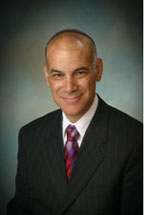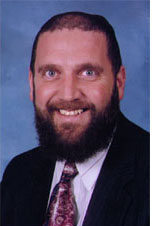| |
|

Scholars-in-residence
program
Presentations are free; kosher meals moderately priced
● Rabbi
Yakov Horowitz, founder, Project Y.E.S. (Youth Enrichment Services)
for
Agudath Israel, Jan. 4-5
● Rabbi Ari
Kahn, director, Foreign Student Programs,
Bar Ilan University, Israel, Feb.
22-23
Call us for details at (619)
287-9890, Reserve Shabbaton meals before January 2
|

LETTER FROM JERUSALEM
Want better health care? Make aliyah!
By Ira Sharkansky
 JERUSALEM—If there is anything of value that I have learned in more than 40 years of studying public policy, it is the value of simplicity. If it is not simple, it probably will not work as advertized. JERUSALEM—If there is anything of value that I have learned in more than 40 years of studying public policy, it is the value of simplicity. If it is not simple, it probably will not work as advertized.
There is no better demonstration of this than the mess of health insurance provided to Americans who think that they are insured. In other words, a serious problem is not only in the 15 percent or so who have no insurance. It is in the case of who knows how many
Ira Sharkansky
Americans whose health insurance is too complicated for those who need to benefit from the coverage.
One manifestation of this appears in a recent New York Times article that follows the plight of a social worker whose job is to help clients sort through their bills and the demands of care providers, pharmacies, medical laboratories, and hospitals, plus the insurance companies and government programs that are supposed to pay some of the costs under definitions too complex for many mortals. Those who suffer most are the old, poorly educated, people unfamiliar with the language, and in need of care.l
Even more chilling is the story of an attorney, the father of a personal friend, who could not manage the paperwork shortly after retiring from a career close to the pinnacle of a major social service agency in Washington.
My curiosity led me to surf the internet, shopping for coverage as if I were a 50 year old with a spouse and two minor children.
The complexities were profound: numerous options associated with varying monthly charges, choice of care givers, co-pays, and deductibles. In cases where the monthly payments were in the range of a few hundred dollars, the annual deductibles were so high that it seemed likely that the plans would amount to no insurance at all.
An intelligent and healthy 50 year old, with the help of a spouse having similar traits and no problematic children would seem able to manage the paperwork. But what would happen 20 years on, when the couple needs more care, and may be overwhelmed with confusing requirements and their own increasing confusion?
Israel is not a perfect society, and its health system is not Paradise on Earth. But simple it is, and thereby scores reasonably high on effectiveness.
To begin with, every resident is a member of one of four HMOs, whose programs are similar. There is a medical tax that pays for basic coverage. It is collected by the government, graduated by income, and withheld from salary in the case of wage earners. Seniors get the benefits without the tax. The basic coverage includes medications, with a small co-pay, as well as all tests. Certain tests require a co-pay equivalent to $3.50. Most blood tests require no co-pay. A visit to a specialist costs the equivalent of $3.50; and if there is more than one visit to the same physician in a quarter, the subsequent ones are without charge. There is no charge for visit to a family physician.
There are options with respect to supplemental insurance, which give preference in terms of waiting times to see a specialist or have surgery, choice of surgeon, as well as nursing home coverage, and coverage of operations overseas that cannot be performed in Israel. Almost all the country's physicians, hospitals, and laboratories are wired into the system, and usually sort out for themselves who pays how much. To our sorrow, Varda and I have had the usual experiences of the aging, and have learned more and more about the costs and complexities. Nothing in our experience approaches the American system in the outlays to the clients or the complexity.
All the supplemental insurances for Varda and I, plus what we pay for medications, and visits with specialists, cost us about $150 per month.
There are problems. Not all of the newest and most expensive medications are included on the list that is covered by insurance. Each year a committee of medical experts, bureaucrats, politicians, and patient advocates quarrels about what to add and how much to demand from the government treasury to cover the costs. There are not enough spare parts for all those who need replacements for their kidneys, hearts, lungs, or whatever. Opportunities are greater for residents who live close to major hospitals than in outlying areas. Not all of our physicians are geniuses, or as loving as one might wish. We do hear in the media of the unfortunate who fall through the cracks.
If the bottom line is longevity, the statistics provide some indications of success. The most recent available Israeli data show life expectancies for Jewish women to be 82 and men 79 ; life expectancy for Arab women is 78 and men 75. American life expectancy for white women is 80 and white men 74. For blacks and others the figures are 76 for women and 69 for men.
The planes are still flying. For all our aging American friends, it may be too late to benefit from all of the increased life expectancy promised by Israeli medicine. The reduced paperwork has its own advantages. But remember, most of it is in Hebrew.


THE VIEW FROM JINSA
On Putin, Time's 'Person of the Year'
By Shoshana Bryen
 WASHINGTON, D.C.—Time magazine named Vladimir Putin its "Person of the Year." Although we would have chosen the U.S. military that turned the corner in Iraq this year despite the doom and gloom guys (or Gen. Petraeus, if you want just one person), we understand the choice. The question for the United States is what to make of it and what to make of Russia. WASHINGTON, D.C.—Time magazine named Vladimir Putin its "Person of the Year." Although we would have chosen the U.S. military that turned the corner in Iraq this year despite the doom and gloom guys (or Gen. Petraeus, if you want just one person), we understand the choice. The question for the United States is what to make of it and what to make of Russia.
In the wake of the collapse of the Soviet Union, the Clinton administration treated Russia the same way it treated the countries of Central Europe and Central Asia - as a victim of communism and a new entry into the world of democracies. It was a mistake of colossal proportions. Russia, historically an imperialist power, had occupied the countries of the Warsaw Pact and swallowed the Baltic States, Ukraine and the Stans, imposing both
Shoshana Bryen
communism and Russification on captive populations. Unlike Estonia, Czechoslovakia (then) or Poland, which emerged in the 1990s as triumphant survivors, Russia emerged a humiliated, rejected and diminished former power.
Internal conditions in Russia had deteriorated under the last decade of communism (demographers reported diseases such as diphtheria, which the West hadn't seen in decades, as well as rampant tuberculosis and alcohol-related diseases). In the post-communist period, salaries and pensions were not paid, inefficient industries threw people out of work, the network of imports and exports collapsed. There was rising crime at home and an ugly war in Chechnya, and the rapid influx of Western media and entertainment all diminished the Russian sense of self and history.
Enter Putin. Chechnya is quiet (the dead are rarely noisy), pensions are back, and the ruble is stable (enhanced by the West's need for oil and natural gas, which Russia has in abundance). In foreign affairs, Putin has put the United States on notice. Arms sales in the Arab world, trade and dialogue with Iran including a recently announced shipment of nuclear fuel to Bushehr, obstructionism in the UN, meeting Hamas leadership in Moscow, manipulating natural gas shipments through Ukraine to Western Europe, membership in the Asian Six Party Talks and the Middle East Quartet all announce Russia's return as a player.
The price for stability, economic progress and foreign policy clout was the radical diminution of democracy, free markets and free presses. None of these were historically important to the Russian people, however. Putin is "Person of the Year" because Russia is back and the Russian people like it and him. Not democratic, not necessarily our friend, just back and demanding its due.
How America responds is crucial.
Our immediate foreign policy concerns are to stem radical Islamist terrorism; to prevent the rise of a nuclear Iran; to watch warily the emergence of China; to protect our friends and allies; to enhance consensual government, human rights and individual freedoms (not to be confused with spreading "democracy" through phony elections). Some are congruent with Russia's interests; some are not. This, then, simply adds a requirement for the continual realistic engagement of Russia as the power and potential obstructionist that it is, not the fictional victim of communism or permanent enemy of the West that some would make it.



THE JEWISH CITIZEN
Jury service left editor with mixed
feelings
By Donald H. Harrison
 SAN DIEGO—Having completed service last week as the foreman of a jury in a criminal case, I can say there are aspects of the American legal system that make me feel very proud, while there are others that I find disappointing, even embarrassing. SAN DIEGO—Having completed service last week as the foreman of a jury in a criminal case, I can say there are aspects of the American legal system that make me feel very proud, while there are others that I find disappointing, even embarrassing.
San Diego County uses the one day/ one trial system. If you report to the jury pool in the morning and you are not selected to serve on a trial jury, you go home at the end of the day with your obligation fulfilled. If you are picked,
Donald H. Harrison
your obligation lasts as long as the trial does. A movie explaining what being a juror entails, focuses on the opening words of the Preamble of the United States Constitution: “We the people…”
And, indeed, we the people in the assembly room were a diverse lot, comprised of men and women, of a variety of racial groups, native-born and immigrant, young and old, gay and straight, and subscribing to a multiplicity of religious beliefs. There were people there who had advanced college degrees and some who never cottoned to schooling. There were rich people and poor people.
We were America in microcosm.
This made me feel good in the same abstract way that the current race for the American presidency does. I am excited that by picking any of five leading candidates for the presidency, America will make another stride towards full acceptance of our nation’s diversity. We might choose a president who is the first woman to occupy the position, or the first African-American, the first Latino-America, the first Italian-American or the first Mormon. How wonderful that we have such a pool to draw from! How great is our diversity!
After going through a process of voir dire, in which the judge, defense attorney and prosecuting attorney asked us questions assessing our fairness and predilections, I was sworn for a jury panel and soon was listening to opening statements and testimony. Our jury started its duties on a Monday, heard more testimony Tuesday, received our instructions and began deliberations on a Wednesday, and reached our verdict on a Thursday.
Our jury was racially and religiously diverse. There were 11 women on the jury, so as the only male, I represented gender diversity. I also was the lone Jew on the panel. The other jurors elected me as foreman and then allowed me to demonstrate my gratitude. I readily assented to having the “men’s” and “women’s” bathrooms redesignated as “first come, first serve” facilities—just like home.
The 12 of us included school administrators and employees of utilities, hotels, an insurance company and a real estate company. There was a graduate student and a retired teacher. I was the only journalist, but one of our alternates was a photographer. I believe the other alternate was a long-distance delivery service driver. Although they sat through the trial with us, they did not go with u into the deliberation room.
The jurors and alternates had become acquainted during lunches and short breaks in the trial when the courtroom principals needed to argue matters out of our earshot. We were permitted to discuss anything during our breaks, so long as we did not discuss the case we were hearing. And, we honored that promise.
Some of us learned during these breaks about each other’s jobs, how we met our respective spouses, our favorite restaurants, the ages of each other’s children/ grandchildren.
The defendant in our case was charged with a multiplicity of counts involving forgery, possession of a concealed weapon, and possession of illegal drugs. Some of these charges were easier to decide than others. The first day we found consensus on some of the counts, while learning that we had no immediate agreement on others.
What went on in the jury room, at least in this particular case, made me feel quite proud. We drew on each other’s strengths. We all remained courteous and respectful of each other, notwithstanding the fact that we occasionally disagreed. Those who were in the minority in straw votes on some issues stated their concerns, and the jurors on the other side of the question, helped them to resolve those concerns.
For example, one juror stepped up to a whiteboard and helped us develop a time line in the case.
Another juror carefully read through documents that were admitted into evidence, but which had been only briefly alluded to by the attorneys. Some jurors helped us to see some logical inconsistencies between what was said in spoken testimony and what we found in the documents.
As a result of this fair-minded group process, when we reached our verdict, we were able to do so without any reservations. As the law requires, we had an “abiding conviction” (beyond any reasonable doubt) that we had reached a proper and well-reasoned decision.
We all felt the experience had been a worthwhile exercise of our civic duty. But some of us also had qualms and concerns about the process.
Along with many other Americans, I am one who hates political partisanship. It sickens me that the politicians in the House of Representatives and in the Senate would rather posture in an effort to gain reelection than to actually solve problems. From long experience as a political reporter, I believe many of them would deliberately vote against a measure that they know would be good for the country just to make sure that someone from the other party doesn’t get the credit.
To me, it is neither surprising nor unjustified that the approval ratings are very low both for the Congress and for the White House. Either personally or through his staff members, President Bush often is as much in the thick of the partisanship as Nancy Pelosi of the House or Harry Reid of the Senate. Like his predecessors, President Bush probably figures he has no choice.
Naively, I had believed that below the level of the U.S. Supreme Court, the judicial system was more or less shielded from bitter partisanship. But now I fear this was just an illusion. After this trial, I’m tending toward the conclusion that partisanship is endemic to the judicial branch of government and that it can be just as bitter and just as destructive as the partisanship of the other two branches.
Courtroom partisanship isn’t between Republicans and Democrats, although individual players may graduate to that. Instead it is between prosecutors and defense lawyers, whom our judiciary system demands be adversaries rather than collaborators in the search for justice.
There’s a saying that in a trial witnesses should tell the “truth, the whole truth and nothing but the truth” but that is just a saying. In reality, there is the prosecution truth, the defense truth, the admissible truth, the stipulated truth and even the relevant truth. Both the prosecution and defense try to manipulate these truths any way they can to benefit their side of the case. Our jury saw what such an adversarial system can lead to—a deputy district attorney and a defense counsel who barely could stand the sight of each other.
One made faces and rolled eyes when the other was talking; the other accused the first of being unfair to the defendant. Have you ever gone to someone’s house where members of the family were sniping at each other? Some of us on the jury had that same uncomfortable feeling.
When we returned our verdict and thought the trial was over, the prosecutor told us that there was just one more thing for us to do, a “silly” thing, according to her, which was to simply look at a piece of paper and determine whether the defendant had been convicted once before or twice before. The defense attorney got up and said this was not just a “silly” thing; it was a matter of great moment. We needed to decide carefully. They offered us no evidence on either side of the argument other than a document showing that the defendant had been convicted in a previous trial of two counts of armed robbery, and had served his sentences concurrently
Was a conviction on two counts, the same as two separate convictions? Nobody told us, nor was anyone willing to state to us why we—rather than the judge—should be deciding this question. So we sent a note from the jury room asking for more instructions. After we reassembled in the court room, the prosecuting attorney continued to suggest that this was just a minor matter, ministerial really, requiring no judgment from us. In fact, she’d put a sticky on the place in the document (which we already had read) that she said makes it obvious what to do. Once again the defense counsel told us this was serious; that the deputy district attorney was trying to load up this conviction.
We went back into the jury room and decided that something as serious as whether the verdict we had rendered in the case should be considered a “second strike” or a “third strike” against the defendant was far too important to be treated so cavalierly by the prosecuting attorney. The defendant had served his prison time for his crime back in 1995; now the prosecution apparently wanted us to apply retroactively the ‘three strike law” to send him away for life instead of for however many years the judge otherwise would mete out when she pronounces sentence.
We jurors felt that the matter of how to apply the three-strikes law was a question for the legislature and the judiciary to decide, based upon the same kind of considered deliberation that we had given to our verdict on the initial 12 counts. Certainly we were unwilling to make a decision based upon whether we believed it was a “silly” matter or a “serious” one—without evidence to support either contention.
Using the standard that the prosecution hadn’t proved its case to us, I voted along with my fellow jurors that the man’s prior trial had been one strike, and this trial was his second. We reported our decision in the courtroom, were thanked by the judge for our service, and we were excused.
As we left the courthouse, several of my fellow jurors expressed the feeling that we—and more importantly the defendant—had been treated shoddily by the prosecutor in that last phase of the trial. We hoped that such a tactic, calling a decision that a jury must make a “silly” matter, is the exception in the prosecutor’s office and not the rule.
We still had good feelings that had been engendered by our careful deliberations, by our respect for each other, and by the diversity of our talents and perspectives as jurors. However, our good feelings about the legal system definitely had been diminished.


TORAH ON ONE FOOT
Why is Judah represented by the lion?
By Rabbi Leonard Rosenthal
 SAN DIEGO—In our synagogue’s Twelve Tribes fused glass panels in the Belenzon Lobby, the tribe of Judah is represented as a lion. Have you ever wondered why Judah is associated with a lion (as in "the lion of Judah")? It comes from the "Testament of Jacob" at the end of the book of Genesis. SAN DIEGO—In our synagogue’s Twelve Tribes fused glass panels in the Belenzon Lobby, the tribe of Judah is represented as a lion. Have you ever wondered why Judah is associated with a lion (as in "the lion of Judah")? It comes from the "Testament of Jacob" at the end of the book of Genesis.
As Jacob realizes that the end of his life is approaching he gathers his sons around him to bestow upon each a final blessing. Although rabbinic tradition sees these blessings as prophecy, modern scholars believe they reflect the later historical relationship of the tribes in settled Israel.
This is Judah’s blessing:
Rabbi Leonard Rosenthal
"You, O Judah, your brothers shall praise;
Your hand shall be on the nape of your foes:
Your father’s sons shall bow low to you.
Judah is a lion’s whelp;
On prey, my son, have you grown.
He crouches, lies down like a lion,
Like the king of beasts—who shall dare rouse him?
The scepter shall not depart from Judah,
Nor the ruler’s staff from between his feet;
So that tribute shall come to him
And the homage of people shall be his." (Gen. 49:8-10)
Jacob identifies Judah with the lion. Judah is regal, powerful, arouses fear in others, and a natural leader. "The scepter shall not depart from Judah" alludes to King David and God’s covenant with him. God promises David that future kings of Israel will only be elected from David’s descendants, including the future Messiah.
Although historically Judah emerged as the dominant Israelite tribe, especially after the destruction of the Northen Kingdom of Israel in 722 B.C.E., Jacob’s blessing of him proves troubling in context. First, Judah was not Jacob’s first born. That distinction belonged to Reuben. Second, Judah instigated the sale of Joseph into slavery: "Then Judah said to his brothers, ‘What do we gain by killing our brother and covering up his blood? Come let us sell him to the Ishmaelites....’" (Gen. 37:26-27)
Finally, Judah prevented his daughter-in-law, Tamar, from marrying his son, Shelah, as was his responsibility under the Levirite laws. This led Tamar to take matters into her own hands and trick Judah into sleeping with her such that she would bear a child in the name of her deceased husband, Er.
How could a man with such a checkered past merit such a great blessing? Our rabbis taught that it was because he did teshuva, he repented of his misdeeds.
Although Judah did engineer the sale of Joseph into slavery, it was also Judah who finally confessed the brothers’ sins to Joseph in Egypt and offered to take Benjamin’s place in captivity. In addition, when Tamar reproached him for not allowing her to marry Shelah, Judah responded: "She is more in the right than I, inasmuch as I did not give her to my son Shelah." (Gen. 38:26)


AMAZING STORIES OF JUDAISM
A child's possession held for safekeeping
By Rabbi Baruch Lederman
 SAN DIEGO—Yes dear readers, I know Chanukah is over, but we just got this too-good-not-to-share story from devoted shulweek reader Aviva Lopin. The following true story is told by Dr. Blair Grubb of Toledo, Ohio: SAN DIEGO—Yes dear readers, I know Chanukah is over, but we just got this too-good-not-to-share story from devoted shulweek reader Aviva Lopin. The following true story is told by Dr. Blair Grubb of Toledo, Ohio:
Several years ago, a physician from southern France contacted me. His granddaughter had taken ill with a disease that baffled the physicians there. Her symptoms seemed to match those I had described in an article on disorders of the autonomic nervous system. I collaborated with the child's French physicians, directing their diagnostic testing. At last we came to a diagnosis and a course of therapy. During the next several weeks, the child made a seemingly miraculous recovery.
Rabbi Baruch Lederman
In the summer of 1996, on a visit to France, we met and drove to his home in the beautiful southern French countryside. During the drive he told me that his wife had cancer and was not well, but she insisted upon meeting me.
The woman asked, "My husband tells me you are Jewish, no?"
"Yes," I said, "I am a Jew."
"I have something I want to give to you." She disappeared and returned several moments later with a package wrapped in cloth. "When I was a little girl of 8 years, during the Second World War, the authorities came to our village to round up all the Jews. My best friend at that time was a girl of my age named Jeanette. One morning when I came to play, I saw her family being forced at gunpoint into a truck. I ran home and told my mother what had happened and asked where Jeanette was going. 'Don't worry,' she said, 'Jeanette will be back soon.'
I ran back to Jeanette's house only to find that she was gone and that the other villagers were looting her home of valuables, except for the Judaic items, which were thrown into the street. As I approached, I saw an item from her house lying in the dirt. In my little girl's mind I said 'I will take this home and keep it for Jeanette, till she comes back,' but she and her family never returned. Since that time I have kept it. I hid it from my parents and didn't tell a soul of its existence. Indeed, over the last 50 years the only person who knew of it was my husband."
I kept it, hidden, waiting for something, although I wasn't sure what. Now I know what I was waiting for. It was you, a Jew, who helped cure our granddaughter, and it is to you I entrust this."
It was a menorah, but one unlike any I had seen before. Made of solid brass, it had eight cups for holding oil and wicks and a ninth cup centered above the others. Several people told me later that it is probably at least 100 years old.
As I held it and thought about what it represented, I began to cry. All I could manage to say was a garbled "merci." As I left, her last words to me were "II faudra voir la lumiere encore une fois" - "it should once again see light."
I later learned that she died less than one month after our meeting. This Hanukkah, the menorah will once again see light. And as I and my family light it, we will say a special prayer in honor of those whose memories it represents. We will not let its lights go out again.
Dedicated Jeff & Gayle Wysocki in honor of their 14th anniversary which was on Chanukah

SAN DIEGO JEWISH WORLD THE WEEK IN REVIEW
FRIDAY-SATURDAY, DECEMBER 21-22
Dov Burt Levy in Salem, Massachusetts:: Those three soldiers on my refrigerator
Sheila Orysiek in San Diego: Putting icicles on a friendship
Eileen Wingard in San Diego: Foxman warns of growing anti-Semitism
THURSDAY, DECEMBER 20
SPOTLIGHT ON SAN DIEGO JEWISH ACADEMY:Students at San Diego Jewish Academy showcased as artists and as arts critics; three teachers in arts program introduced
Harry Doshay:
Across the Universe shallow, pointless
Jazz lures Collins from metal
Alexa Katz:
Music Within triggers the emotions
Arts Collective is forerunner of school-within-school
Wood teaches photography as 'painting with light'
Daniel Penner:
Neil Young en concierto
Serj Tankian—Elect the Dead
Michelle Rizzi:
Across the Universe blows 'em away
Kipperman advocates for out-of-the-box students
plus
Donald H. Harrison: SDJA Arts Collective photo essay
WEDNESDAY, DECEMBER 19
Garry Fabian in Melbourne, Australia: Former judge faces prison in traffic case ... ... Ex South-African wins ABC writing competition ... Hardliners may exploit conference ... The next chapter in the Toben saga
Donald H. Harrison in La Jolla , California: Capturing the Jewish experience on posters
SDJA Student Quarterly:
William Bohannon: Rabbi tells Jewish views on same-sex marriage
Eitan Frysh: Fresher school lunches promised for next year
Michelle Rizzi: RIP GossipGirl
TUESDAY, DECEMBER 18
Donald H. Harrison at Miramar Marine Corps Air Station: A Marine Corps Museum provides clues to World War II life of my late, civilian father
Alexa Katz in San Diego: They pull in the same direction, but rowers Bohannon, Ritblatt find they often disagree
J. Zel Lurie in Delray Beach, Florida: Har Homa is back in the news
Fred Reiss in Winchester, California: The ever-evolving rituals of Judaism
Ira Sharkansky in Jerusalem: The conundrum of the Gaza rockets
MONDAY, DECEMBER 17
Shoshana Bryen in Washington DC: N.Y. Philharmonic performance gives North Korea an undeserved PR coup
Cynthia Citron in Los Angeles: Kid from Brooklyn revives in N. Hollywood
Gaby Maio in San Diego: Not only warriors sacrifice in the war
Sheila Orysiek in San Diego: After a while, a lover of Jewish food can't help but pass over the New Zealand lamb
David Strom in San Diego: Were there 'Schindlers' among the Arabs?
Jay Winheld in San Diego: An intimate Shabbat with 5,000 delegates
SUNDAY, DECEMBER 16
Donald H. Harrison in San Diego: SDJA Student Quarterly makes its debut
Natasha Josefowitz in La Jolla, California: Is helping each other in crises in our genes?
Rabbi Baruch Lederman in San Diego: The boy hockey player and the seniors
Dov Burt Levy in Lisbon: Portugal: Pleasant surprises for seniors
Ira Sharkansky in Jerusalem: 'Apologies' as presidential campaign tactics
Emma Tuttleman-Kriegler in San Diego: Student finds 'grandfather' at wildfire refuge
< BACK TO TOP
|
|

